|
|
|
|
|
|
|
|
No Arctic science events are planned for today. |
Media
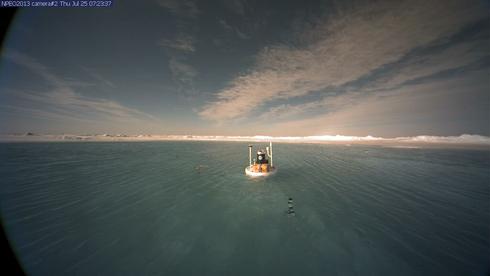 Melting Sea Ice may be Speeding Nature's Clock in the Arctic. Melting Sea Ice may be Speeding Nature's Clock in the Arctic. Spring is coming sooner to some plant species in the low Arctic of Greenland, while other species are delaying their emergence amid warming winters. The changes are associated with diminishing sea ice cover, according to a study published in the journal Biology Letters and led by the University of California, Davis. The timing of seasonal events, such as first spring growth, flower bud formation and blooming make up a plant's phenology -- the window of time it has to grow, produce offspring, and express its life history. Think of it as "nature's clock." In the Arctic, nature's clock is running fast. Science Daily
PATH Camp Application Available. This application is for the 2017 Alaska PATH (Preparing Alaskans for Training in Heathcare) Camps. There will be seven camps held in 2017 located at six different locations in Alaska. Students will be placed in camps based on availability, region, and vacancies. These camps are designed for students ages 15-19 to explore career pathways in the field of healthcare. Students will have the opportunity to earn college credit and industry recognized credentials. Note, the Middle School Camp in Barrow is open to students ages 12-14. Alaska Area Heath Education Centers
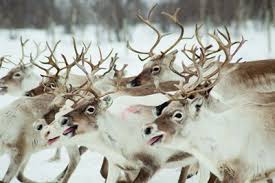 When Their Food Ran Out, These Reindeer Kept Digging. When Their Food Ran Out, These Reindeer Kept Digging. Polar bears aren't the only beloved Arctic animal threatened by climate change. Scientists believe reindeer are at risk as a warming world makes their main winter food source disappear. But reindeer on one Alaskan island are surprising researchers. And that surprise doesn't just come from the fact that the reindeer are hard to spot. National Public Radio Humans May Have Altered Arctic Ice Much Earlier than Thought. For 40 years, heat trapped by human-caused greenhouse gas pollution has been eating away at Arctic sea ice. But for a brief span in the 20th century, Arctic sea ice was actually increasing -- and that may be our fault too, according to a new study. The researchers used historical measurements to learn how the ice had changed, then modeled climate variables to untangle the causes. They found that between 1950 and 1975, certain types of air pollution counteracted the effects of greenhouse gases that hold heat in the Earth's atmosphere. The balance of these gases at that time cooled the Earth and helped sea ice to grow. The findings emphasize the fragility of the Arctic sea ice system, with humanity's changing pollution habits buffeting the region first one way, then the other. Inside Science All-Terrain Cruise "Ship" for the Arctic? Arctic cruising has captured the imagination of a futuristic designer who has developed a concept vehicle called the Resolute - an all-season, all-terrain cruise vessel designed to explore the Arctic and Antarctic regions on tracks. The concept has been developed by Imaginactive, a non-profit organization whose mission is to inspire the next generation to dream and then build the vehicles of tomorrow. Maritime Executive
|
|
Future Events
Year of Polar Prediction (YOPP) Open Session, February 27, 2017 (College Park, MD USA). The Year of Polar Prediction (YOPP) is one of the key elements of the Polar Prediction Project (PPP) under the World Meteorological Organization (WMO) World Weather Research Program. The mission of YOPP is to enable a significant improvement in environmental prediction capabilities for the polar regions and beyond by coordinating a period of intensive observing, modeling, verification, user-engagement and education activities. The core field campaign for YOPP is scheduled to take place from mid-2017 to mid-2019. The International Coordination Office (ICO) of the PPP kindly invites you to attend a YOPP Open Session on Monday, February 27, 2017, which will take place at the NOAA National Centers for Environmental Prediction (NCEP), College Park, Maryland. For more information on the YOPP Open Session, see here.
 The Future of Arctic Entrepreneurship, March 3-4, 2017 (Whitehorse, Yukon Canada). This first symposium will focus on the bilateral partnership between Canada and the United States towards the enhancement of clean energy projects. The two-day event will feature roundtable discussions, based around the foundational dimensions that make a successful renewable energy project. Four focus areas of discussion will be: The Future of Arctic Entrepreneurship, March 3-4, 2017 (Whitehorse, Yukon Canada). This first symposium will focus on the bilateral partnership between Canada and the United States towards the enhancement of clean energy projects. The two-day event will feature roundtable discussions, based around the foundational dimensions that make a successful renewable energy project. Four focus areas of discussion will be:
1. How to overcome technical challenges to develop a project;
2. How stakeholders ensure Indigenous and community engagement;
3. How to ensure the financial commitment necessary for a project; and
4. How policy is either changed or enhanced to promote small-scale renewable energy projects.
Working with experts, academics, government officials, Indigenous leaders, and energy practitioners, the symposium between Canadian and American participants will facilitate a much-needed best practice sharing of how to move the Arctic towards a green, innovative economy.
IV International Forum, March 2017 (Arkhangelsk, Russian Federation) Arkhangelsk will host the Forum. The Forum will be titled Human in the Arctic and will be aimed at putting together joint efforts of the international community to promote effective development of the Arctic region as a territory for comfort life, work and leisure. The Forum will be attended by government officials, representatives of international organizations and prominent business communities, centers for political studies, Polar researchers and members of the international Arctic expeditions, foreign political scientists and economists, Russian and foreign journalists from leading international media organizations. The Forum will be attended by the President of the Russian Federation, Mr. Vladimir Putin. Additional information will be announced here.
The 4th annual Arctic Encounter Symposium (AES) will convene policymakers, industry leaders, and leading experts to confront the leading issues in Arctic policy, innovation, and development in Seattle, WA at the Bell Harbor International Conference Center. As the largest annual Arctic policy event in the United States, the AES mission is to raise awareness, engage challenges, and develop solutions for the future of a region and a people. The two-day program includes two keynote luncheons, expert plenary sessions, break out sessions, a networking cocktail reception and seated three-course dinner.
- The Arctic Cryosphere
- Pollution in the Arctic
- Human Health Aspects of Pollution and Climate Change
- Global and Arctic Systems Feedback Mechanisms
- Resilience within Arctic Ecosystems
- Science and Policy Making
- Socio-Economic Drivers and Impacts of Arctic Change
Organizers announce a call for abstracts which are due by December 2, 2016. The event is organized by the Arctic Monitoring and Assessment Program (AMAP).
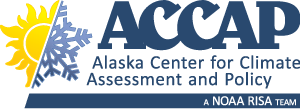 15th annual Climate Prediction Applications Science Workshop (CPASW), May 2-4, 2017 (Anchorage, Alaska USA). The 15th annual Climate Prediction Applications Science Workshop (CPASW), hosted by the U.S. National Weather Service and the Alaska Center for Climate Assessment and Policy, will bring together climate researchers, information producers, and users to share developments in the research and applications of climate predictions for societal decision-making. The theme for this year's workshop is Understanding Extreme Events and Decision-Maker Needs in the Context of Climate Variability and Change. Registration for this workshop will be open on March 1. For more information about the workshop: here. 15th annual Climate Prediction Applications Science Workshop (CPASW), May 2-4, 2017 (Anchorage, Alaska USA). The 15th annual Climate Prediction Applications Science Workshop (CPASW), hosted by the U.S. National Weather Service and the Alaska Center for Climate Assessment and Policy, will bring together climate researchers, information producers, and users to share developments in the research and applications of climate predictions for societal decision-making. The theme for this year's workshop is Understanding Extreme Events and Decision-Maker Needs in the Context of Climate Variability and Change. Registration for this workshop will be open on March 1. For more information about the workshop: here.
Week of the Arctic, May 7-12, 2017 (Fairbanks and Anchorage, Alaska USA). The Arctic Council Ministerial Meeting in Fairbanks, May 2017, provides an amazing opportunity to showcase the city and state. The Ministerial in Fairbanks will highlight science and policy in important ways, at the same time the 20th Anniversary of the Arctic Council is celebrated. Following the Ministerial Meeting, the Arctic Council Host Committee will also host events in Anchorage. This week will include the International Arctic Assembly on May 9th. The International Arctic Assembly will demonstrate an innovative approach to multi-disciplinary, cross-sectorial dialogue that will feature local, national and international speakers from business, policy and research. Plenary panel discussions will focus on Arctic policy, Alaska's unique role in informing and influencing state, national and international policy, scientific research, indigenous leadership and culture, and social-economic development. See the program for the full week here.
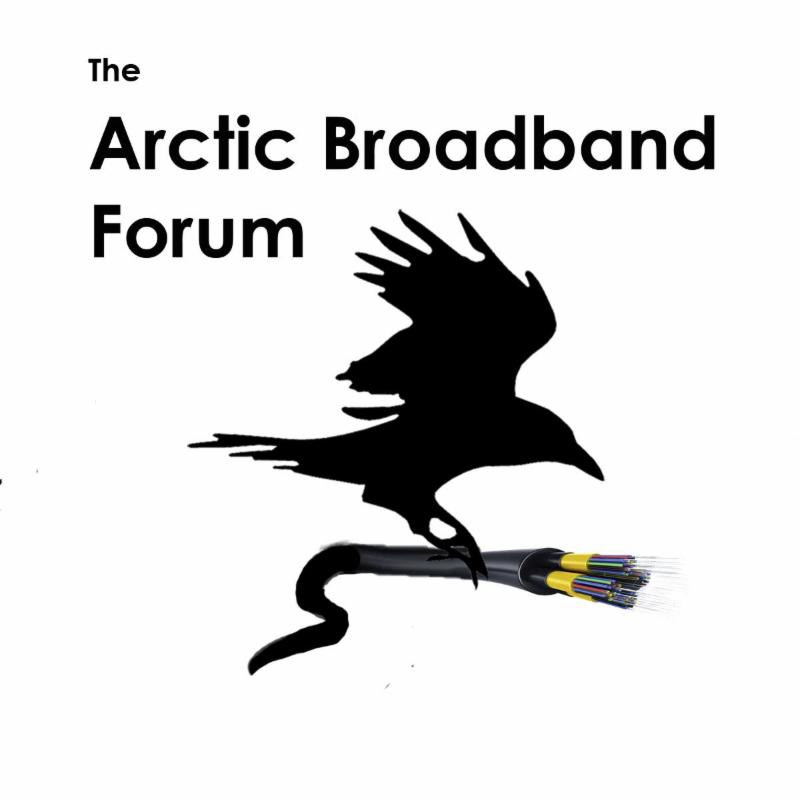 The Arctic Broadband Forum 2017, May 8-9, 2017 (Fairbanks, AK USA). The Arctic Broadband Forum will unite educators, researchers and industry from across the World to discuss the challenges, successes and potential of telecommunications and broadband deployment in the Arctic for economics, healthcare and education. Specific emphasis will be placed on the role of broadband and digital technologies on the cultural preservation and self-determination of indigenous populations throughout the Arctic. The Arctic Broadband Forum 2017, May 8-9, 2017 (Fairbanks, AK USA). The Arctic Broadband Forum will unite educators, researchers and industry from across the World to discuss the challenges, successes and potential of telecommunications and broadband deployment in the Arctic for economics, healthcare and education. Specific emphasis will be placed on the role of broadband and digital technologies on the cultural preservation and self-determination of indigenous populations throughout the Arctic.
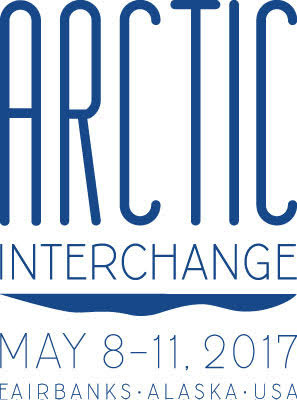 Arctic Interchange, May 8-11, 2017 (Fairbanks, Alaska USA). Arctic Interchange, May 8-11, 2017 (Fairbanks, Alaska USA). On the sidelines of the Arctic Council's Fairbanks Ministerial, which occurs May 11, 2017, the Week of the Arctic is an exciting time to explore accomplishments made during the U.S. Chairmanship, current and emerging Arctic trends, and the intersection of policy, research and business. The Alaska Arctic Council Host Committee, working in close cooperation with the University of Alaska Fairbanks and community partners, has organized a robust program full of opportunities for participants and interested Arctic stakeholders to learn, share, network and collaborate. We hope to see you at these presentations, workshops, receptions and facilitated policy discussions as we transition from the U.S. to Finnish Chairmanship of the Arctic Council.
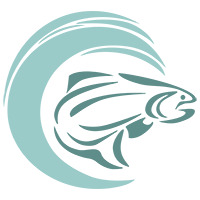 Impacts of a Changing Environment on the Dynamics of High-Latitude Fish and Fisheries, May 9-12, 2017 (Anchorage, Alaska USA). This symposium examines the impacts of the environment, especially climate change and variability, on the dynamics of arctic and sub-Arctic species of commercial, subsistence, and ecological importance. The symposium will focus on the effects of warming, loss of sea ice, ocean acidification, and oceanographic variability on the distribution, phenology, life history, population dynamics, and interactions of these species and how a better understanding of these effects can inform the assessment and management of fish and invertebrate populations in a changing ocean for the benefit of affected communities. Impacts of a Changing Environment on the Dynamics of High-Latitude Fish and Fisheries, May 9-12, 2017 (Anchorage, Alaska USA). This symposium examines the impacts of the environment, especially climate change and variability, on the dynamics of arctic and sub-Arctic species of commercial, subsistence, and ecological importance. The symposium will focus on the effects of warming, loss of sea ice, ocean acidification, and oceanographic variability on the distribution, phenology, life history, population dynamics, and interactions of these species and how a better understanding of these effects can inform the assessment and management of fish and invertebrate populations in a changing ocean for the benefit of affected communities.
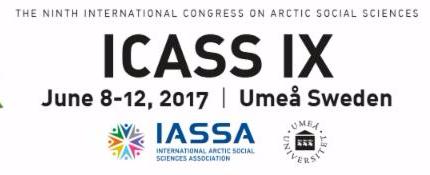 Ninth International Congress of Arctic Social Sciences: People and Places (ICASS IX), June 8-12, 2017 (Umea, Sweden). ICASS IX's theme is People & Place. Research on social sciences and humanities have a great responsibility to address the challenges for sustainable development in the Arctic, with a specific focus on the many different parts of the Arctic and the people that live there. The multiple Arctics have lately been addressed by many policy makers and researchers. The purpose is often to counteract the stereotypic understanding of the Arctic too often represented by icebergs and polar bears. A focus on people and place highlights the many variances across the region in terms of climate, political systems, demography, infrastructure, history, languages, legal systems, land and water resources etc. Ninth International Congress of Arctic Social Sciences: People and Places (ICASS IX), June 8-12, 2017 (Umea, Sweden). ICASS IX's theme is People & Place. Research on social sciences and humanities have a great responsibility to address the challenges for sustainable development in the Arctic, with a specific focus on the many different parts of the Arctic and the people that live there. The multiple Arctics have lately been addressed by many policy makers and researchers. The purpose is often to counteract the stereotypic understanding of the Arctic too often represented by icebergs and polar bears. A focus on people and place highlights the many variances across the region in terms of climate, political systems, demography, infrastructure, history, languages, legal systems, land and water resources etc.
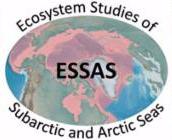 2017 ESSAS Open Science Meeting on Subarctic and Arctic Science, June 11-15, 2017 (Tromsø, Norway). 2017 ESSAS Open Science Meeting on Subarctic and Arctic Science, June 11-15, 2017 (Tromsø, Norway). This 3rd Open Science Meeting (OSM) is intended to attract an interdisciplinary group of scholars who will be prepared to discuss their research in the Subarctic, in both the North Atlantic and the North Pacific, and the Arctic Ocean. The title of the OSM is Moving in, out and across the Subarctic and Arctic marine ecosystems: shifting boundaries of water, ice, flora, fauna, people and institutions. It will document the changes that have occurred, the processes that led to these changes, and how future changes are likely to further affect these marine ecosystems. It will also to consider the people who depend upon these ecosystems and how they may be able to cope with the changes in the ecosystem goods and services that they derive from these ecosystems. These include the availability of subsistence foods and the opportunity for commercial fishing. Economic and societal pressures on coastal communities and nations will be sought in relation with the ecosystem changes. To put the present day in a longer perspective, the conference will include a session on the paleoecology of people in Subarctic and Arctic regions that were forced to adjust to the changing temperature and sea-ice conditions in the past.
The 2nd Asian Conference on Permafrost, July 2-6, 2017 (Sapporo, Japan). Delegates will participate in state-of-the-art oral and poster presentations in the modern city of Sapporo (host of the 1972 Winter Olympics). Field trips will visit marginal and extrazonal mountain permafrost sites that support unique geo-eco-hydrological features. All aspects of frozen ground research will be covered, from needle ice to deep permafrost, from frozen ground engineering in cities to permafrost on volcanoes, and from links between frozen ground and ancient cultures to present-day outreach. Plan now to enjoy science and engineering, excellent food, and unique field trips in Sapporo.
Co-hosted by U.S. National/Naval Ice Center (NIC) and the U.S. Arctic Research Commission (USARC). A biennial symposium originating in 2001 that focuses on U. S. naval operations and national strategic issues in an "ice-free Arctic." This symposium brings together nationally and internationally recognized experts on Arctic observations, climate change, and maritime operations.
As the Symposium is organized jointly by two leading Research Institutes of Russian Academy of Science - Institute of Water Problems and Melnikov Permafrost Institute, particularly the contributions on following research topics are welcome:
- Observational evidences of change in coupled permafrost-hydrology system.
- Present state and future projections of local, regional and pan-Arctic hydrology.
- Modeling studies representing landscape evolution, dynamics of water storages and permafrost degradation.
- Impacts of permafrost hydrology changes on local communities.
VII International Conference on Cryopedology, August 21-25, 2017 (Yaktsk, Russia). The conference will be hosted by the Institute for Biological Problems of the Cryolithozone of the Siberian Branch of the Russian Academy of Sciences (SB RAS). Plenary reports will be organized in the hall of the Academy of Sciences of the Sakha (Yakutia) Republic. The official languages of the conference are English and Russian (with translation). All technical facilities (projectors, computers, video sets) will be available during the conference for presentation of papers. Additional information will be available soon. See the Facebook page here.
 2017 University of the Arctic Rectors' Forum and Conference, August 27-29, 2017 (Aberdeen, Scotland). This conference will also consider how northern scholarship can add to discussions on the North into broader terrains of intellectual engagement. In so doing, it will challenge dominant paradigms of research in both the natural and the social sciences, above all by calling into question the very separation of the world of nature from that of human society which underwrites the distinction between these two branches of scientific inquiry. In its place the conference will seek to forge a new practice of interdisciplinary research, done in collaboration with northern residents and on their terms, which recognizes that every discipline is itself an ongoing conversation, or a way of knowing, rather than a compartment within an overarching, hierarchically organized system of knowledge. Conversations from the North will, then, help to generate a science that is more open-ended, responsive to environmental variation and respectful of the wisdom of inhabitants. 2017 University of the Arctic Rectors' Forum and Conference, August 27-29, 2017 (Aberdeen, Scotland). This conference will also consider how northern scholarship can add to discussions on the North into broader terrains of intellectual engagement. In so doing, it will challenge dominant paradigms of research in both the natural and the social sciences, above all by calling into question the very separation of the world of nature from that of human society which underwrites the distinction between these two branches of scientific inquiry. In its place the conference will seek to forge a new practice of interdisciplinary research, done in collaboration with northern residents and on their terms, which recognizes that every discipline is itself an ongoing conversation, or a way of knowing, rather than a compartment within an overarching, hierarchically organized system of knowledge. Conversations from the North will, then, help to generate a science that is more open-ended, responsive to environmental variation and respectful of the wisdom of inhabitants.
- Small and off-grid community energy solutions
- Oil and gas development
- Renewable energy
- Regulation and Financing
- Transportation and transmission
The AES is a multi-disciplinary event expected to draw several hundred industry officials, scientists, academics, policy makers, energy professionals and community leaders together to collaborate and share leading approaches on Arctic energy issues.
2017 Arctic Circle Assembly, October 13-15, 2017 (Reykjavik, Iceland). The annual Arctic Circle Assembly is the largest annual international gathering on the Arctic, attended by more than 2000 participants from 50 countries. The Assembly is held every October at the Harpa Conference Center and Concert Hall and is attended by heads of states and governments, ministers, members of parliaments, officials, experts, scientists, entrepreneurs, business leaders, indigenous representatives, environmentalists, students, activists and others from the growing international community of partners and participants interested in the future of the Arctic.
 Polar Law Symposium 2017 and Rovaniemi Arctic Spirit, November 13-16, 2017 (Rovaniemi, Finland). The purpose of the Polar Law Symposium is to examine, in detail, the implications of the challenges faced by the Polar Regions for international law and policy and to make recommendations on appropriate actions by states, policy makers and other international actors to respond to these emerging and re-emerging challenges. The Rovaniemi Arctic Spirit Conference is integrated with the Polar Law Symposium, which will be organized by the Northern Institute for Environmental and Minority Law at the Arctic Center of the University of Lapland. Polar Law Symposium 2017 and Rovaniemi Arctic Spirit, November 13-16, 2017 (Rovaniemi, Finland). The purpose of the Polar Law Symposium is to examine, in detail, the implications of the challenges faced by the Polar Regions for international law and policy and to make recommendations on appropriate actions by states, policy makers and other international actors to respond to these emerging and re-emerging challenges. The Rovaniemi Arctic Spirit Conference is integrated with the Polar Law Symposium, which will be organized by the Northern Institute for Environmental and Minority Law at the Arctic Center of the University of Lapland.
 POLAR 2018, June 15-27, 2018 (Davos, Switzerland). POLAR2018 is a joint event from the Scientific Committee on Antarctic Research (SCAR) and the International Arctic Science Committee (IASC). The SCAR meetings, the ASSW and the Open Science Conference will be hosted by the Swiss Federal Institute for Forest, Snow and Landscape Research WSL under the patronage of the Swiss Committee on Polar and High Altitude Research. The WSL Institute for Snow and Avalanche Research SLF is organizing POLAR2018. POLAR 2018, June 15-27, 2018 (Davos, Switzerland). POLAR2018 is a joint event from the Scientific Committee on Antarctic Research (SCAR) and the International Arctic Science Committee (IASC). The SCAR meetings, the ASSW and the Open Science Conference will be hosted by the Swiss Federal Institute for Forest, Snow and Landscape Research WSL under the patronage of the Swiss Committee on Polar and High Altitude Research. The WSL Institute for Snow and Avalanche Research SLF is organizing POLAR2018.
|
|

  
4350 N. Fairfax Drive, Suite 510
Arlington, VA 22203, USA
External links in this publication, and on the USARC's World Wide Web site ( www.arctic.gov) do not constitute endorsement by the US Arctic Research Commission of external Web sites or the information, products or services contained therein. For other than authorized activities, the USARC does not exercise any editorial control over the information you may find at these locations. These links are provided consistent with the stated purpose of this newsletter and the USARC Web site.
|
|
|
|
|
|
|
|
|